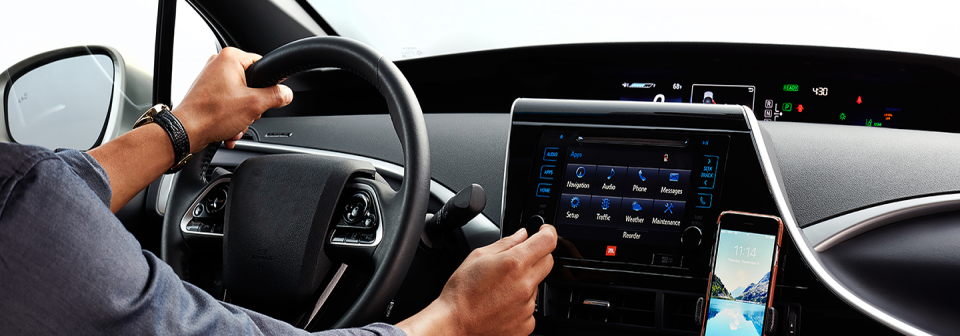Connected car tech is clever stuff, but are auto brands forgetting one fundamental element in their quest for competitive advantage: the driver?
Demonstrating real-world relevance is a basic step many manufacturers seem to be missing.
 Auto brands have invested a ton of money developing connected car features in an attempt to lure buyers and gain competitive advantage. But is that investment paying off? In short, ‘not really’, according to the recent global Connected Car study* that explored the attitudes and purchasing behaviour of more than 8,500 connected car owners.
Auto brands have invested a ton of money developing connected car features in an attempt to lure buyers and gain competitive advantage. But is that investment paying off? In short, ‘not really’, according to the recent global Connected Car study* that explored the attitudes and purchasing behaviour of more than 8,500 connected car owners.
Apparently,  nearly half of connected car owners just don’t ‘get’ the features at their disposal. How do we draw this conclusion? Well, the fact that most didn’t even know they owned a connected car makes it a reasonable assumption. Plus, many were oblivious to the benefits of the technology, failing to see how it could enhance their everyday lives.
nearly half of connected car owners just don’t ‘get’ the features at their disposal. How do we draw this conclusion? Well, the fact that most didn’t even know they owned a connected car makes it a reasonable assumption. Plus, many were oblivious to the benefits of the technology, failing to see how it could enhance their everyday lives.
Pretty shocking stuff, especially for connected car manufacturers and component suppliers. But maybe there’s an opportunity here for auto brands willing to take a step back and reassess how they market their latest technical wizardry - to find down-to-earth ways to explain out-of-this-world technology.
I think simplicity, not complexity is the way forward and I’ve boiled it down into four key points, to make it, well, simple.
1. Relevance
It seems people can’t imagine the usefulness of connectivity. Ask them what they want from their new car and they’ll tell you ‘safety’ and ‘fuel economy’. Surprisingly, these purchasing considerations top the list, ahead of ‘design’ and ‘brand image’, and way ahead of ‘connectedness’. If auto brands can make a clearer link between the tech in their vehicles and how it enhances cost efficiency and protection, then connected car features suddenly become very relevant indeed. Sat nav., traffic updates, route planning, collision avoidance, lane departure warning – all of these plug straight into the most influential purchasing decisions. No pun intended.
2. Understanding
I could be wrong here, but if someone doesn’t know that a feature exists, let alone how it works and what it’s for, it’s safe to assume they won’t use it. This is a real issue for connected car owners – they aren’t aware of the tech at their disposal because it wasn’t brought to their attention by the sales person who sold them the car. Maybe tech gets in the way of sealing the deal, who knows. Anyway, this again could be an opportunity for a pioneering auto brand to seize the initiative. With the current size of dashboard info screens, there’s an opportunity here for on-board, in-car tutorials like those found on smartphones, televisions and most PC operating systems. And if that’s a stretch, what about specialist showroom-based technical gurus whose only remit is to educate new owners in all the wonders of their car’s connectivity? A bit like the ‘geniuses’ in your local Apple Store.
3. Usage
Following on from the previous point, encouraging initial usage is key to continued enjoyment of the vehicle’s connected features. When that happens, owners become familiar with the interface and what it can do. This makes the car brand ‘sticky’ – owners are less likely to choose a different brand when the time comes to change as they don’t want to have to learn an entirely new system. It’s the intentional barrier currently used by the big smartphone companies. (Apple again.) Much easier to stick with what you know than change platforms.
4. Trust
Trusting that the promised benefits materialise and prove useful is one of the big reasons why many connected car owners didn’t access the features or sign up to subscription based packages. There’s a distinct lack of belief and a huge amount of scepticism. Now, while there will always be a group of people that will be last to the party when it comes to innovation, they also happen to be the biggest group of people. Accelerating their appreciation of connectivity at an earlier stage (i.e. in the dealership when they are buying the car!) will help turn them from cynics into users and advocates.
Connected cars are full of clever stuff, but maybe auto brands aren’t being clever enough at marketing them.  Rather than following a ‘build it and they will buy’ model, they have an opportunity to grow their market share by aligning their features with people’s lives.
Rather than following a ‘build it and they will buy’ model, they have an opportunity to grow their market share by aligning their features with people’s lives.  Less cleverness, more relevance, please.
Less cleverness, more relevance, please.
* Kantar TNS recently published the latest Connected Car study, including a summary report which can be downloaded here: http://go.tnsglobal.com/connected-cars









